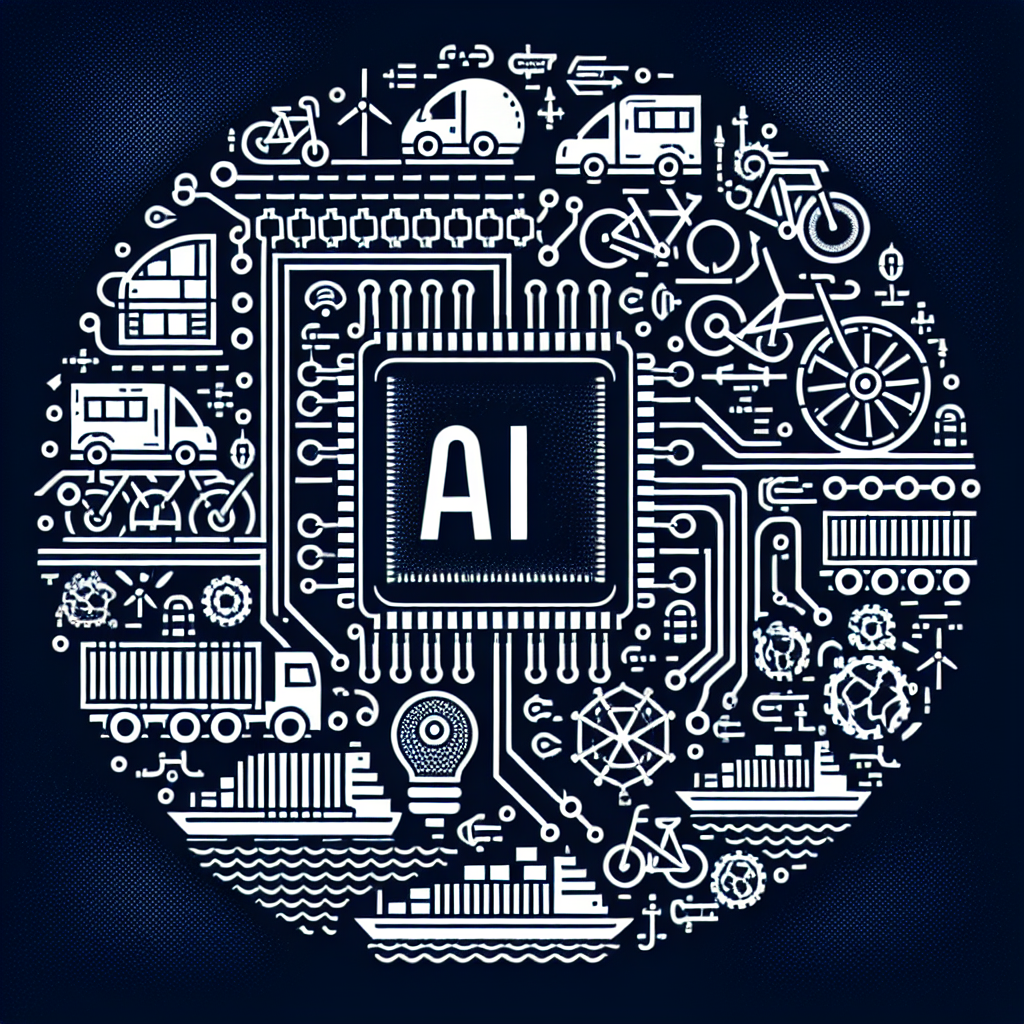Artificial Intelligence (AI) is revolutionizing the transportation and logistics industry by providing innovative solutions to enhance sustainability and efficiency. From autonomous vehicles to predictive maintenance systems, AI is transforming the way goods are transported and delivered, ultimately reducing environmental impact and optimizing performance. In this article, we will explore the various AI applications in sustainable transportation and logistics and how they are shaping the future of the industry.
AI Applications in Sustainable Transportation:
1. Autonomous Vehicles:
One of the most significant AI applications in sustainable transportation is autonomous vehicles. These self-driving cars, trucks, and drones are equipped with AI technology that enables them to navigate roads and deliver goods without human intervention. By eliminating the need for human drivers, autonomous vehicles can reduce accidents, improve fuel efficiency, and optimize routes, ultimately leading to a more sustainable transportation system.
2. Traffic Management:
AI-powered traffic management systems use real-time data and predictive analytics to optimize traffic flow and reduce congestion. By analyzing traffic patterns, weather conditions, and other variables, these systems can adjust traffic signals, reroute vehicles, and provide drivers with real-time updates to improve efficiency and reduce emissions.
3. Predictive Maintenance:
AI algorithms can predict when vehicles and machinery are likely to fail based on historical data and performance metrics. By detecting potential issues before they occur, companies can schedule maintenance proactively, reduce downtime, and extend the lifespan of their assets. This not only improves efficiency but also reduces waste and emissions associated with unnecessary repairs.
4. Route Optimization:
AI-powered route optimization software uses algorithms to calculate the most efficient routes for delivery vehicles based on factors such as traffic conditions, fuel consumption, and delivery schedules. By optimizing routes, companies can reduce fuel consumption, lower emissions, and improve on-time delivery rates, ultimately enhancing sustainability and customer satisfaction.
5. Energy Management:
AI technologies can help transportation companies optimize energy usage by analyzing data from vehicles, infrastructure, and weather conditions. By monitoring energy consumption and identifying opportunities for improvement, companies can reduce fuel costs, lower emissions, and increase overall efficiency.
AI Applications in Sustainable Logistics:
1. Inventory Management:
AI-powered inventory management systems use machine learning algorithms to predict demand, optimize inventory levels, and reduce waste. By analyzing historical data and market trends, these systems can help companies avoid stockouts, minimize overstock, and improve overall inventory efficiency.
2. Warehouse Automation:
AI-driven warehouse automation systems use robotics and machine learning to streamline operations, reduce labor costs, and improve efficiency. By automating tasks such as picking, packing, and sorting, companies can increase throughput, reduce errors, and optimize space utilization, ultimately leading to a more sustainable and cost-effective logistics operation.
3. Supply Chain Optimization:
AI technologies can help companies optimize their supply chains by analyzing data from various sources, including suppliers, transportation providers, and customers. By identifying inefficiencies and bottlenecks in the supply chain, companies can make informed decisions to improve performance, reduce costs, and enhance sustainability.
4. Last-Mile Delivery:
AI-powered last-mile delivery solutions use algorithms to optimize delivery routes, predict customer preferences, and reduce delivery times. By leveraging real-time data and analytics, companies can improve delivery efficiency, reduce emissions, and enhance customer satisfaction.
5. Carbon Footprint Reduction:
AI technologies can help companies reduce their carbon footprint by analyzing data from across the supply chain and identifying opportunities for improvement. By optimizing routes, reducing waste, and improving energy efficiency, companies can lower emissions and contribute to a more sustainable transportation and logistics industry.
FAQs:
Q: How is AI transforming the transportation and logistics industry?
A: AI is transforming the transportation and logistics industry by providing innovative solutions to enhance sustainability, efficiency, and customer satisfaction. From autonomous vehicles to predictive maintenance systems, AI technologies are revolutionizing the way goods are transported and delivered, ultimately reducing environmental impact and optimizing performance.
Q: What are the benefits of using AI in sustainable transportation and logistics?
A: The benefits of using AI in sustainable transportation and logistics include reduced emissions, improved efficiency, lower costs, and enhanced customer satisfaction. By leveraging AI technologies, companies can optimize routes, reduce waste, and improve energy usage, ultimately leading to a more sustainable and profitable operation.
Q: How can companies implement AI in their transportation and logistics operations?
A: Companies can implement AI in their transportation and logistics operations by partnering with AI technology providers, investing in AI-powered solutions, and training their employees to use AI tools effectively. By integrating AI technologies into their operations, companies can improve efficiency, reduce costs, and enhance sustainability.
In conclusion, AI applications in sustainable transportation and logistics are transforming the industry by providing innovative solutions to enhance efficiency, reduce emissions, and optimize performance. From autonomous vehicles to predictive maintenance systems, AI technologies are reshaping the way goods are transported and delivered, ultimately leading to a more sustainable and profitable operation. By leveraging AI technologies, companies can improve efficiency, reduce costs, and enhance customer satisfaction, ultimately shaping the future of the industry.

